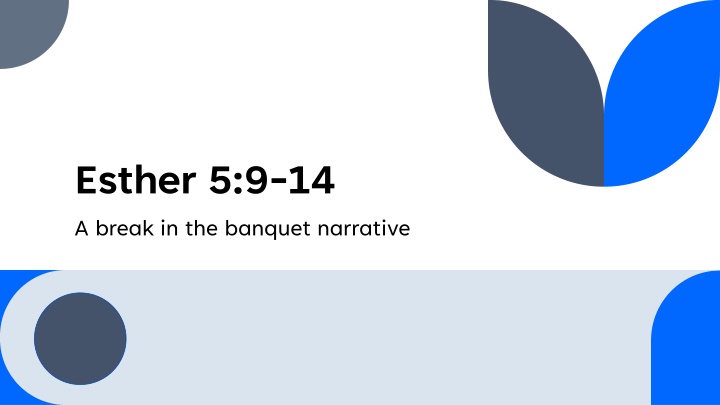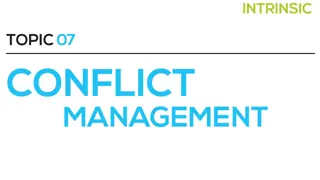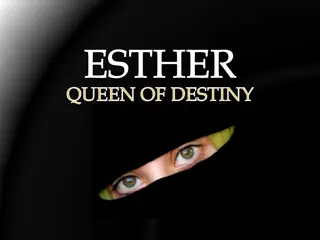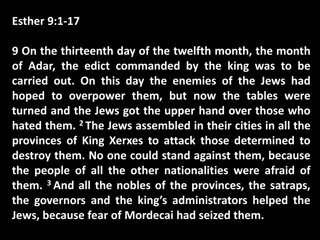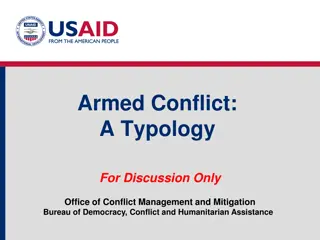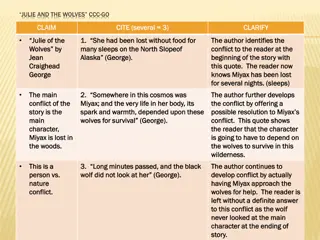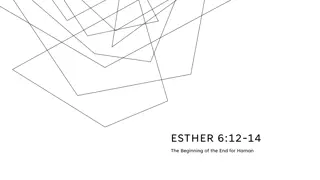Esther's Courage and Mordecai's Defiance: A Story of Strategy and Conflict
Esther displays courage by inviting the king and Haman to a banquet, setting a wise strategy in motion. Meanwhile, Mordecai's defiance towards Haman escalates tensions, emphasizing the concept of interdependence between individuals in a historical conflict.
Download Presentation

Please find below an Image/Link to download the presentation.
The content on the website is provided AS IS for your information and personal use only. It may not be sold, licensed, or shared on other websites without obtaining consent from the author.If you encounter any issues during the download, it is possible that the publisher has removed the file from their server.
You are allowed to download the files provided on this website for personal or commercial use, subject to the condition that they are used lawfully. All files are the property of their respective owners.
The content on the website is provided AS IS for your information and personal use only. It may not be sold, licensed, or shared on other websites without obtaining consent from the author.
E N D
Presentation Transcript
Esther 5:9-14 A break in the banquet narrative
Review from last week Filled with a burst of courage, Esther dresses in her best, most appealing attire and presents herself at the royal court. There are great differences between MS and LXX in this section. Following MS, the king welcomes Esther without much concern for protocol, which recasts chapter 4. He gives her the golden scepter to kiss and allows her to voice her request. Esther uses the opportunity o invite the king and Haman to a banquet. While at the banquet, the king allows Esther to make her request, and Esther invites the king and Haman to a second banquet (the seventh of the narrative). The sequence of evens thus far in chapter 5 points to a wise strategy on the part of Esther and make her the undisputed heroine of this story. 10/5/2024 Esther 5:9-14 2
Opening Prayer O God, whose glory it is always to have mercy: Be gracious to all who have gone astray from your ways, and bring them again with penitent hearts and steadfast faith to embrace and hold fast the unchangeable truth of your Word, Jesus Christ your Son; who with you and the Holy Spirit lives and reigns, one God, for ever and ever. Amen. 10/5/2024 PRESENTATION TITLE 3
9 Haman went out that day happy and in good spirits. But when Haman saw Mordecai in the king s gate, and observed that he neither rose nor trembled before him, he was infuriated with Mordecai; There is a contrast between the first and last sentences in the verse: Haman went out happy and in good spirits (but) he was infuriated with Mordecai. The in-between belongs to Mordecai who continues to stubbornly refuse to pay Haman obeisance. We already know there is no tradition impeding the behavior, which means that this is a personal and historical conflict. Mordecai gets the credit, but it is his insolence that threatened the lives of the Jews. The insolence has grown. The original insult was failure to pay obeisance (bow down before,) but now, he even refuses to stand up to salute a superior. He also refuses to pay any respect to a man in whose presence others trembled. This lack of trembling can be seen as courage (A righteous Jew vows before God and king only ) but it would appear as though Mordecai is stoking the flames of anger and vengeance. Haman probably would not have accepted anything short of full obeisance, but it is telling that Mordecai does Not even try a lesser form of a salute (High five? Short wave? Slight bow of the head? Peace sign? Anything? Buller, Buller? 10/5/2024 Esther 5:9-14 4
Mordecai and the Concept of Interdependence A state in which two or more people, situations, variables, or other entities rely on or react with one another such that one cannot change without affecting the other (APA)
10 nevertheless, Haman restrained himself and went home. Then he sent and called for his friends and his wife Zeresh, The only two people with a strategy in this passage are Haman and Esther. The king seems clueless to the manipulations of Haman and the enticements of Esther. Mordecai seems intent on poking the hornet's nest. They both make the situation much worse by their cluelessness (king) and arrogance (Mordecai.) In the meantime, the real duel here is between Haman and Esther. ESTHER s Strategy: Bind the king and Haman through hospitality traditions, wait for the opportune time to reveal her Jewishness, expose Haman s intentions, and request the great favor from the King to save all the Jews. (After attending two banquets the King is bound by honor to grant the request.) HAMAN s Strategy: Restrain himself from acting in defense of his honor, call on his advisers for a consultation, build gallows for the execution of Mordecai, bend the King to his will through manipulation, oversee the execution of his bitter enemy, eliminate all the Jews from around the entire empire. Mordecai, who will be honored in Susa very soon, seems to have only one thought in his mind at this point in the narrative: Protect my honor at all costs, even if it leads to death of an entire ethnic group. 10/5/2024 Esther 5:9-14 6
Esther and the Concept of Destiny The things that will happen in the future, but also the force that some people think controls what happens in the future and is outside human control.
11 and Haman recounted to them the splendor of his riches, the number of his sons, all the promotions with which the king had honored him, and how he had advanced him above the officials and the ministers of the king. This is a Fool s Narrative which the readers would have laughed at. The readers know that kings are fickle, and power is transitory. A King today will be a corpse tomorrow (Ben Sira 10:10) The enumeration of goods is an ascription of honor and God s favor when someone else mentions them, but is absolute foolishness when mentioned by the person: Genesis 13:2 Genesis 24:35 Job 42:12 2 Kings 20:12-19 Esther 5:11 Luke 12:13-21 Riches, sons, promotions, power-over others. This exclamation places Haman at the same level of foolishness as Hezekiah in 2 Kings and Ahasuerus at the start of this book 9he had a 180-day banquet to display is glory and the power of his riches.) This verse serves as part one of a simple equation ( The higher you climb ) we will see the end of this equation in the next chapter (the lower you fall. ) 2 Samuel 1:19, 27. Shows this principle, captured beautifully by Ben Sira in the verse above. 10/5/2024 Esther 5:9-14 8
The Book of Esther and The Great Reversal Isaiah 61:1-11 Hosea 5:14, 13:7-8 Mark 10:31 Luke 1:52; 6:25; 16:25 Psalm 75:7 Psalm 147:6
12 Haman added, Even Queen Esther let no one but myself come with the king to the banquet that she prepared. Tomorrow also I am invited by her, together with the king. This verse needs to be understood with the humor it deserves. Remember that one of the features of the Royal Courtier Tales is that the reader often knows something the evil character doesn t yet know. Haman has bought Esther s strategy (hook, line, and sinker). Her strategy of keeping enemies closer is paying dividends. He gloats about his importance to her and the honor she has bestowed on him twice already. She let no one but This is Sun Tzu s The Art of War (5th Century B.C.) Chapter 10. That a Jewish woman would apply this principle, as well as many other of his 33 principles, is quite remarkable. Now, the author does not use these words, but the practice is the same. We have seen the element of surprise used on many occasions in Scripture as in 2 Samuel 12-13. David is lulled into a state of righteous indignation and believes this is one of many cases in which the King s intervention is needed, when in fact, the story has been about him the entire time. Nathan will deliver his devastating conclusion in the same way Esther will deliver hers, You are the man! and This wicked, Haman! Royal tales tend to include this element of surprise. 10/5/2024 Esther 5:9-14 10
The Book of Esther and the Cultus of the Self A message for every generation, especially ours
12 Continued This account of Haman is a comment upon Proverbs 21:24, The proud, haughty person, named Scoffer , acts with arrogant pride. Self-admirers and self-flatterers are really self-deceivers. Haman, the higher he is lifted up, the more impatient he is of contempt, and the more enraged at it. The affront from Mordecai spoiled all. A slight affront, which a humble man would scarcely notice, will torment a proud man, even to madness, and will mar all his comforts. Those disposed to be uneasy, will never want something to be uneasy at. Such are proud men; though they have much to their mind, if they have not all to their mind, it is as nothing to them. Many call the proud happy, who display pomp and make a show; but this is a mistaken thought. Many poor cottagers feel far less uneasiness than the rich, with all their fancied advantages around them. The man who knows not Christ, is poor though he be rich, because he is utterly destitute of that which alone is true riches. (Matthew Henry Commentary) 10/5/2024 Esther 5:9-14 12
13 Yet all this does me no good so long as I see the Jew Mordecai sitting at the king s gate. There is a cognitive dissonance often seen in those with power: The more power some people have, the more threatened they feel by others. This is the cognitive dissonance we see in Haman. Although he is powerful and only second to the king, he is obsessed with the idea that the very existence of his enemy threatens not only his power, but his ability to feel happiness. He has ten sons (a sign of great blessing), he has wealth (a sign of moral righteousness), he has great power (a sign of his importance in relation to his peers), he can bend the will of the King (a sign of his elevated status within court), he has servants, counselors, a dutiful wife, respect, adulation, etc. yet, the mere sight of Mordecai sours his mood and leads to real despondency, What good is it to me, as long as The Wisdom of Ben Sira has a lot to say about the type of anger that brings people to ruin: 1:22, Unjust anger can never be justified; anger pulls a person to utter ruin. 27:30, Wrath and anger, these also are abominations, yet a sinner holds on to them. 28:3, Does anyone nourish anger against another and expect healing from the LORD? 30:24, Jealousy and anger shorten life, and anxiety brings on premature old age. 10/5/2024 Esther 5:9-14 13
Haman and the Dynamics of Obsession A persistent disturbing preoccupation with an often-unreasonable idea or feeling
14 Then his wife Zeresh and all his friends said to him, Let a gallows fifty cubits high be made, and in the morning tell the king to have Mordecai hanged on it; then go with the king to the banquet in good spirits. This advice pleased Haman, and he had the gallows made. We have seen the dangers of unwise counsel in this book before: Look at the dismissal of Vashti, the edict against the Jews, and now the plot to kill Mordecai. This is a warning for all powerful people, Be cautious of the counsel you receive. There is a bit of arrogance here which the reader would see with the humor it deserves. Haman s advisors say, tell the king It is arrogance to a humorous extreme. Although this king seems to be a puppet, he is still the king, and no subject should tell him what to do. We will see the humor next, when instead of a kill order, Haman will get a very different order. Fifty Cubits is an exaggerated height (75 Feet or the height of a six-story building). The size of the structure points to the extremely unwise nature of the advice, but also to the depth of Haman s hatred. The fact that the sentence will be reversed to apply to Haman himself is a sign of the Great Reversal of the book. The idea that the extent of the revenge is directly related to the amount of hate in a person s heart is also another teaching of Ben Sira, No sufferings are worse than the sufferings caused by people who hate you. No revenge is worse than revenge taken by an enemy. (Ben Sira 25:14.) 10/5/2024 Esther 5:9-14 15
50 Cubits and the Custom of Proportion The great height being to call as much attention as possible to the execution, that thereby Haman s glory might be proportionately increased. (Ellicott s Commentary)
Summary The verses between the sixth and seventh banquets highlight Haman s wickedness and lack of wisdom, on the one hand, and Mordecai s ascend, on the other. In this first part, we see Haman s wickedness and foolishness. In the next part, we will see Mordecai s recognition and early stages of his ascension to power. Throughout these verses we will see a full reenactment of the Great Reversal common in Holy Scripture. We lose sight of Esther in these in-between verses, but we can not forget that she is the real heroine of this story. She is the one that rises above Mordecai s insolence and Haman s evil. She is the one who ultimately will save her people.
